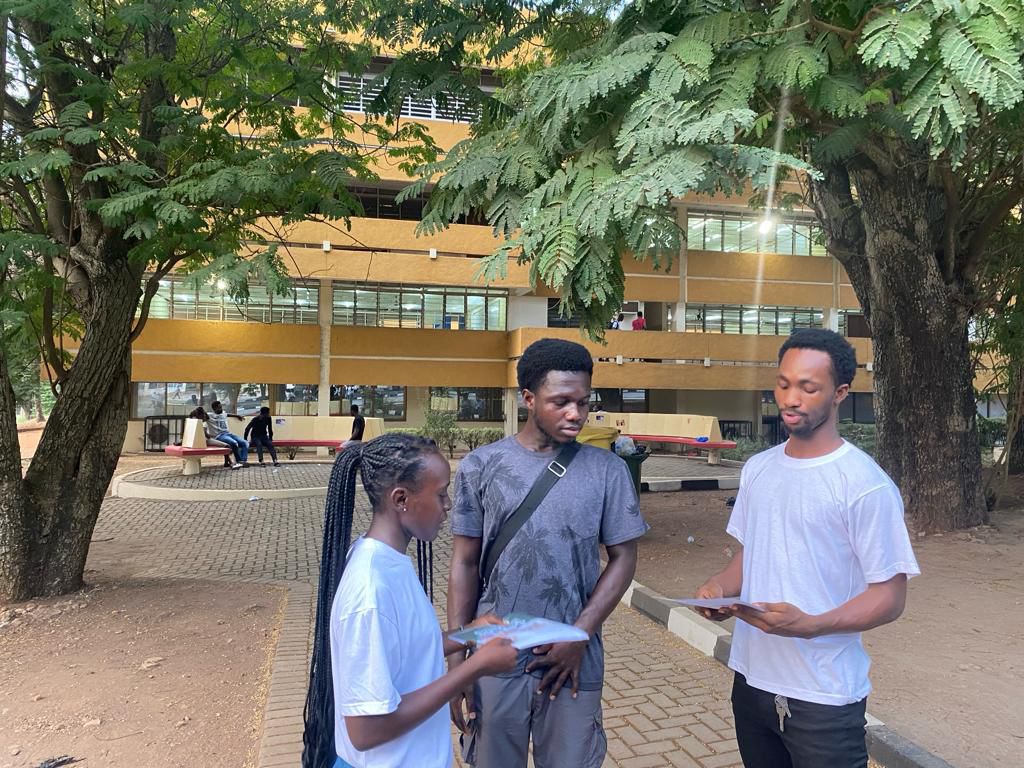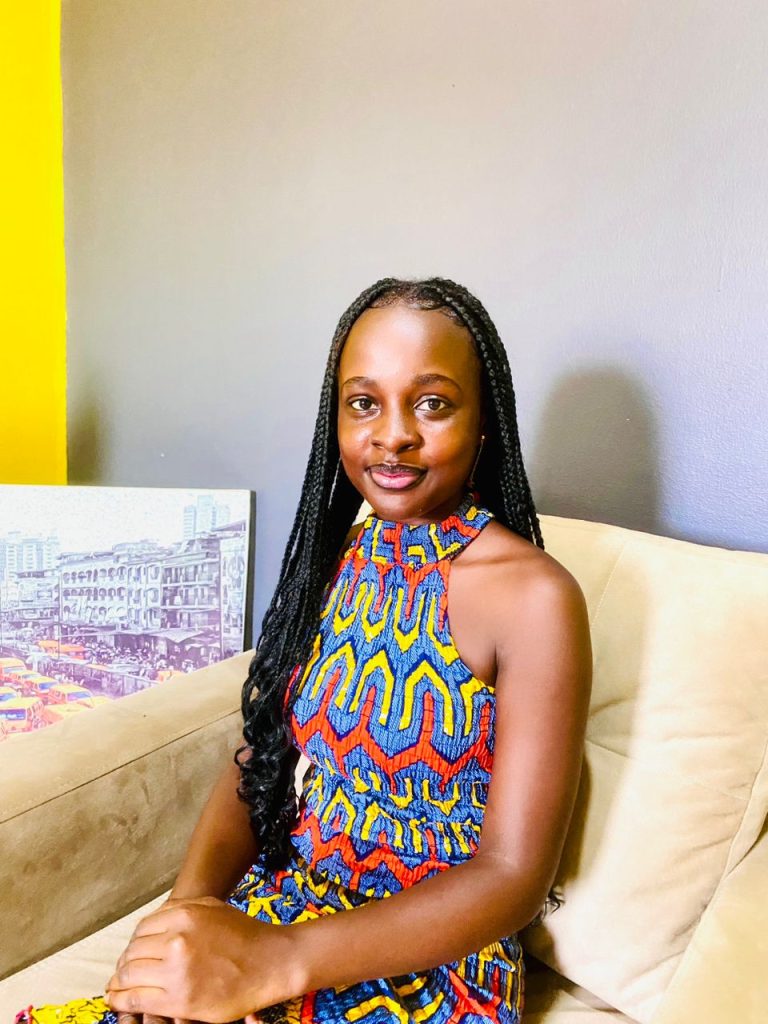Mary Sampson’s Journey From Misinformed to Fact-Check Advocate
Mary never imagined she was a part of the problem. Mary Sampson, a 19-year-old communications student at Kwame Nkrumah University of Science and Technology (KNUST), has always been interested in media and politics. Growing up in a politically active household, she was constantly involved in conversations about governance and elections. She considered herself an aspiring journalist, but she unintentionally became a party to the same thing she wished to fight like many of her contemporaries. Like many young Ghanaians, she relied on social media as her primary news source. Since she could not distinguish between fact and fiction, she unintentionally contributed to the spread of fake news and sociopolitical rumors. As the 2024 elections approached, the online space became saturated with sensationalized political propaganda and news. She frequently forwarded viral posts on WhatsApp and Facebook, believing that extensively shared content must be accurate. She accepted and disseminated unverified news, ranging from potential election manipulation to candidate conspiracy theories. While she enjoyed participating in political discussions and the governance process, she had no clue that she was misinformed and also spreading fake news.

From Misinformed to Empowered: BudgIT Ghana’s Workshop
Mary’s perspective shifted when she attended BudgIT Ghana’s Roadmap to Elections 2024 youth activists workshop on September 25, 2024, held at the Ghana-India Kofi Annan Center for Excellence in ICT. Organized to address misinformation and disinformation in Ghana’s electoral process, the workshop introduced her to a new world of fact-checking and digital literacy. Led by experts like Dr. David Normanyo from the National Peace Council and Mr. Confidence Mawusi, Lead for Child Online Protection, the workshop afforded participants a practical and insightful experience in fact-checking.
For the first time, Mary had access to digital tools designed to verify information, such as FactCheck Ghana, Africa Check, Dubawa Ghana, InVID, Veracity mobile app, and Twitonomy. She learned to trace sources, identify biases, and debunk misleading narratives. She also engaged in a case study exercise, where she and other participants analysed real-world misinformation cases and applied their newfound skills.
The workshop’s highlight was the launch of BudgIT Ghana’s civic tech platform for Incidence Mapping and the Defenders’ Manual, a comprehensive guide educating youth, CSOs, and media professionals on combatting election-related misinformation. The manual’s availability in Twi made it even more accessible to a broader audience. Inspired by the initiative, Mary realized she had the power to influence digital discourse positively.
She felt lost in the maze of misinformation before the workshop, overwhelmed by the sheer volume of conflicting narratives, yet she never considered herself a part of the problem. Sharing posts seemed harmless to her, merely contributing to many online conversations. She considered battling misinformation a job for journalists and fact-checkers, not regular students like herself.
That perspective changed during the workshop. Seeing real-life examples of how misinformation could distort public opinion and cause harm was a wake-up call. She didn’t realize how quickly false stories spread or how easily the truth could be manipulated. However, she felt a shift with each tool she learned, fact-checking resources and verification techniques. What had once seemed like an impossible battle was now a responsibility that was shaping up to be something she could handle.

Becoming a Fact-Check Advocate
Empowered to take action with knowledge and filled with newfound confidence, she stepped into discussions, ready to challenge misinformation with facts. She no longer hesitated to ask, “Where is the evidence?” or to assist her colleagues in verifying sources. Determined to make a difference, she has set out to create awareness campaigns at her university and take the conversation beyond campus into local radio stations and community dialogues.
From once feeling powerless in the face of misinformation, she was now leading the charge against it. Leaving the workshop, she was no longer merely a student exchanging information; she was an informed advocate dedicated to combating the spread of fake news. Within weeks, she had a reputation among her peers as the “Ask Google Fact-checker,” confronting misinformation in student group chats and on social media.
Mary demonstrated her commitment to countering disinformation by participating in BudgIT Ghana’s Essay Competition on the Youth Perspective on Presidential Candidates, an initiative aimed at encouraging critical analyses of electoral manifestos. Her commitment to countering disinformation did not end with personal growth; it sparked real change. As a volunteer election observer, she verified reports for BudgIT Ghana’s incident mapping effort during the 2024 general election, ensuring the public received accurate information. She now serves as the campus ambassador for the BudgIT Youth Participatory Forum at KNUST, where she leads efforts to cultivate an informed and engaged student populace. Her impact is undeniable; she played a significant role in curbing the spread of false election news, established herself as a reliable source for political fact-checking among her peers, and received special recognition from her university for leading a digital literacy session.
Why Mary’s Story Matters
Mary’s journey isn’t just a personal triumph; it is proof that informed, empowered citizens can change the course of their communities. Thanks to BudgIT Ghana’s intervention through the Roadmap to Elections 2024 project, she transformed from a passive consumer of information into a frontline defender of truth. She is no longer just a student; she is a force for change. When she encounters information, she does not scroll past it; she questions its veracity. She turns conversations into opportunities for education, empowering her peers with the tools to question, verify, and think critically. In doing so, she personifies young people’s role in ensuring electoral integrity. Mary’s story demonstrates that democracy is preserved in grand halls of power and equally upheld in classrooms, hostels, on social media, and in day-to-day conversations. It starts with empowering individuals with the capacity to disprove falsehoods, and then the ripple effect takes over.
